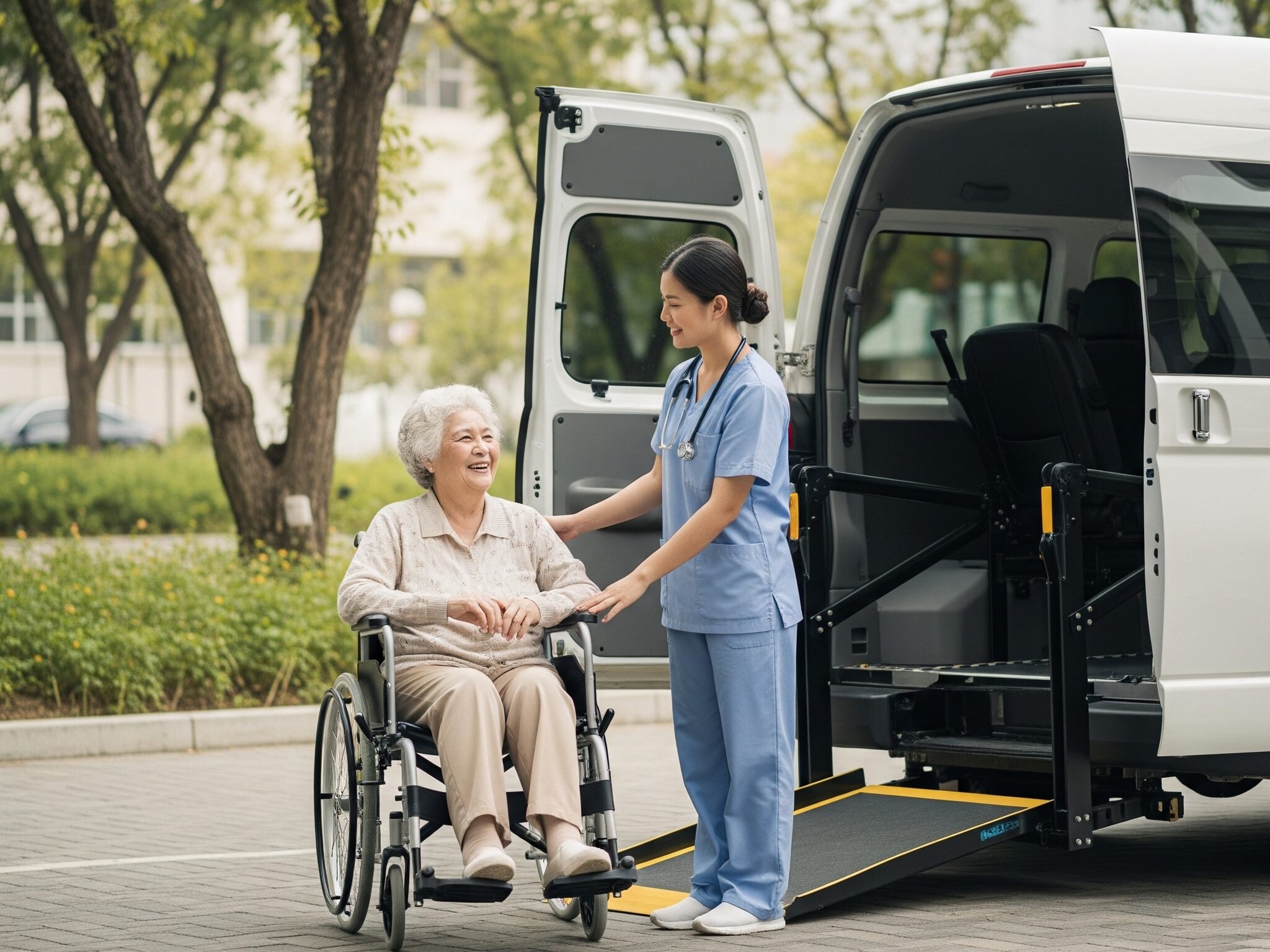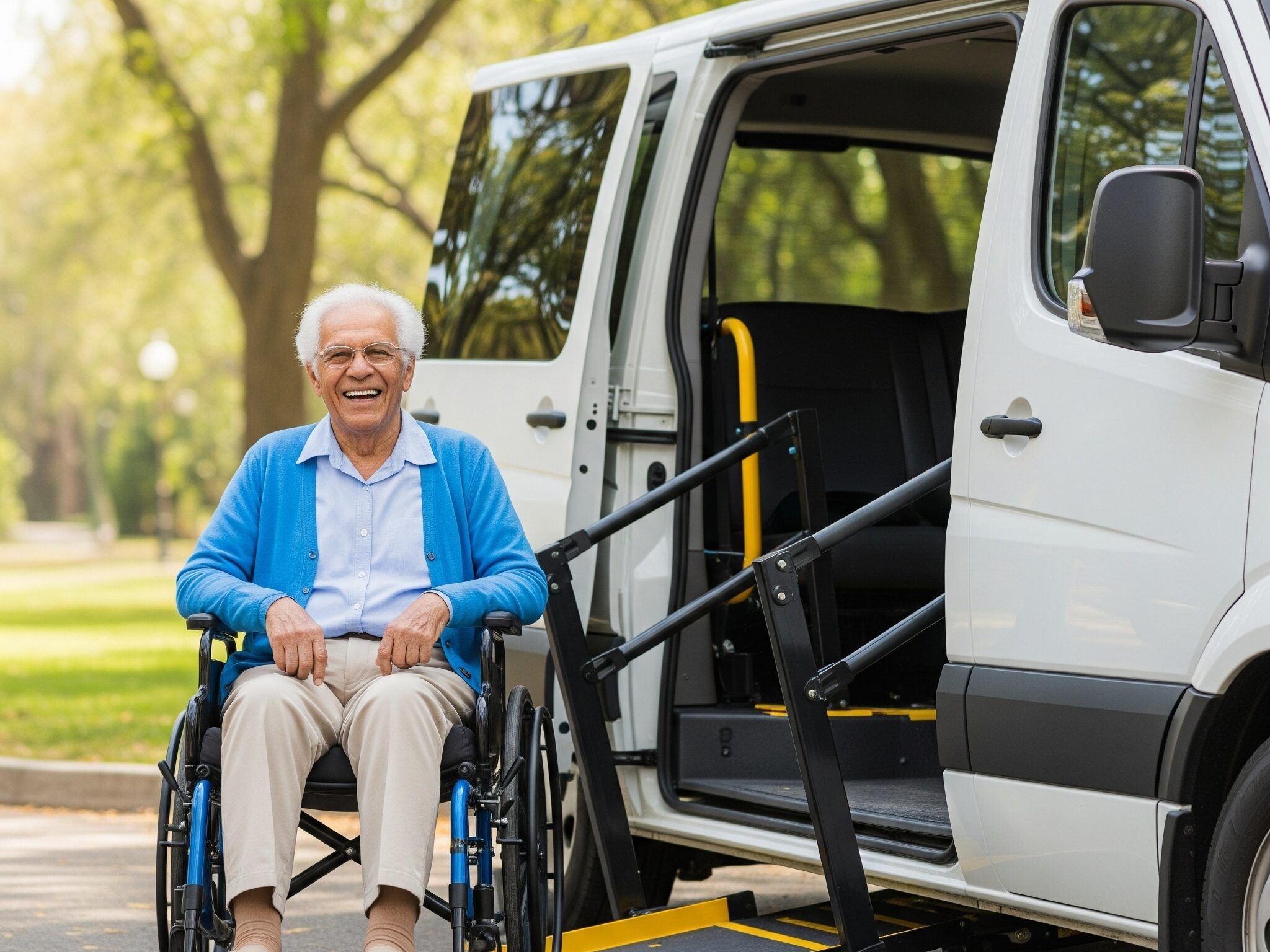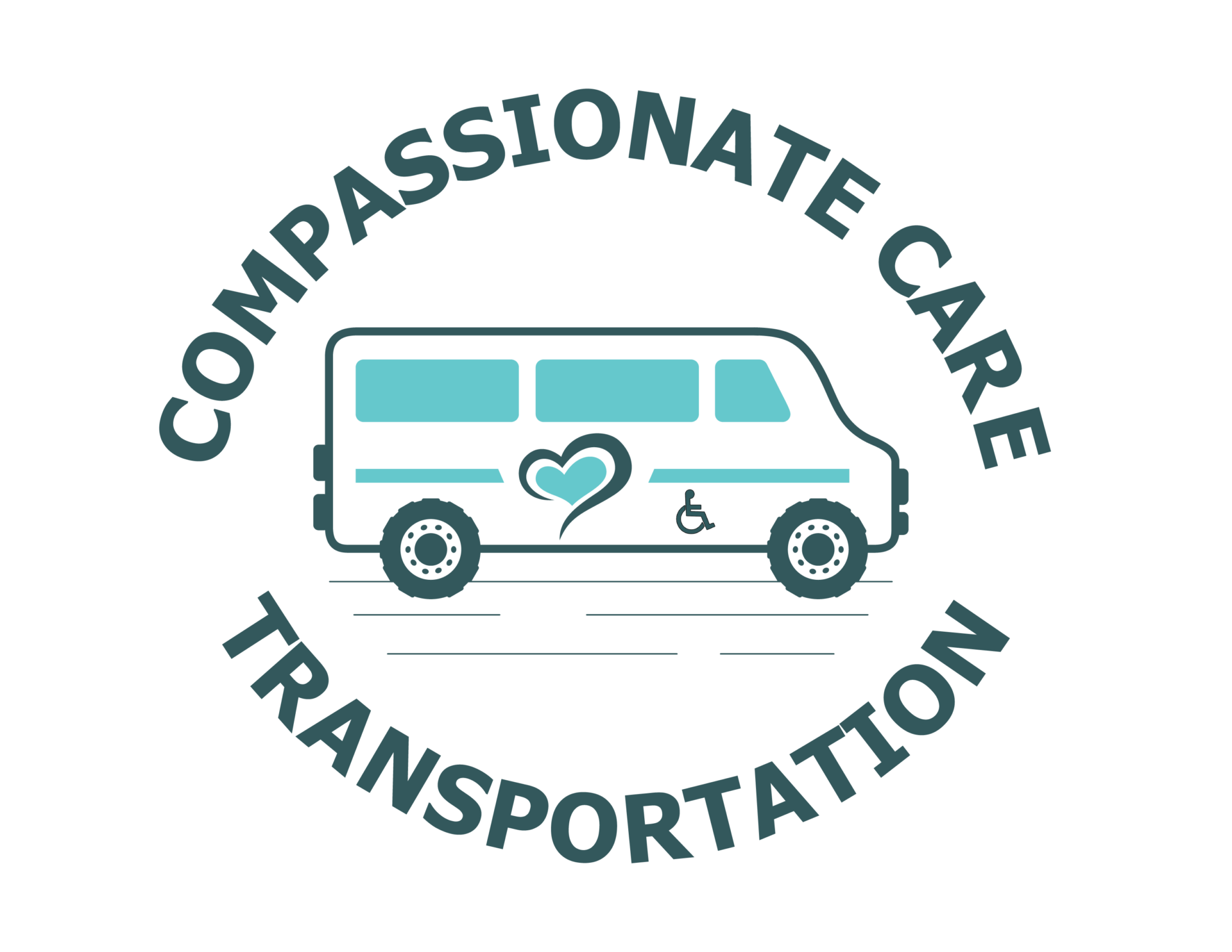Choose the Best Elderly Transportation Service for Your Loved One

Navigating transportation for elderly and disabled individuals can feel like solving a complex puzzle – one where the stakes are deeply personal and the right solution means maintaining dignity, independence, and quality of life.
Imagine your loved one needing to attend a critical medical appointment, but traditional transportation options feel impersonal, uncomfortable, or simply unavailable. This is where specialized transport for elderly and disabled services become more than just a convenience – they become a lifeline.
The journey of finding the perfect transportation solution isn’t just about moving from point A to point B. It’s about ensuring safety, comfort, respect, and personalized care. Whether your family member uses a wheelchair, requires mobility assistance, or needs extra support during medical trips, the right transportation service can transform what could be a stressful experience into a smooth, reassuring journey.
Understanding Your Loved One’s Unique Transportation Needs
Every individual’s transportation requirements are as unique as their fingerprint. Some key considerations include:
- Mobility level and specific accessibility needs
- Frequency of medical appointments
- Comfort and safety preferences
- Budget constraints
- Geographic coverage of transportation services
By carefully evaluating these factors, you can make an informed decision that provides peace of mind for both you and your loved one. Remember, the goal isn’t just transportation – it’s maintaining independence, dignity, and quality of life.
In the following sections, we’ll dive deep into the critical aspects of selecting the most suitable senior citizen transportation service that meets your family’s unique needs.
Understanding the Importance of Specialized Transportation Services
When we talk about transport for elderly and disabled, we’re not just discussing a simple logistics solution – we’re addressing a critical lifeline that maintains human dignity, independence, and quality of life. Traditional transportation methods often fall short in meeting the nuanced needs of seniors and individuals with disabilities.
Why One-Size-Fits-All Doesn’t Work
Imagine trying to fit a square peg in a round hole – that’s precisely what generic transport for elderly and disabled do when serving these individuals. Each person has unique mobility requirements that demand specialized, personalized care.
- A wheelchair user needs more than just a vehicle – they require careful handling, secure equipment, and trained staff
- Seniors with limited mobility need patient, compassionate drivers who understand their specific challenges
- Medical transportation isn’t just about reaching a destination, but ensuring a comfortable, stress-free journey
The Hidden Challenges of Standard Transportation
Standard public transit or ride-sharing services often overlook critical aspects of senior citizen transportation:
- Limited wheelchair accessibility
- Lack of trained personnel for mobility assistance
- Insufficient time allocation for boarding and disembarking
- Minimal consideration for medical equipment transportation
Specialized transportation services bridge these gaps, offering not just a ride, but a comprehensive, compassionate mobility solution. They transform transportation from a potential source of anxiety into a reliable, comfortable experience.
More Than Just a Ride: A Comprehensive Support System
The right non-emergency medical transport service does more than move people – it provides:
- Door-through-door assistance
- Trained staff understanding diverse mobility needs
- Safe, comfortable wheelchair-accessible vehicles
- Respectful, patient interaction
- Reliable scheduling for medical appointments
By recognizing transportation as a holistic service rather than a mere logistical function, we can ensure our loved ones maintain their independence, dignity, and connection to the world around them.
Key Factors to Consider When Choosing Transportation for Seniors
Selecting the right transport for elderly and disabled isn’t just a checklist – it’s an art form that requires careful consideration, empathy, and strategic thinking. Let’s break down the essential factors that can transform a simple ride into a lifeline of comfort and reliability.
Safety: The Non-Negotiable Priority
When it comes to senior citizen transportation, safety isn’t just a feature – it’s the foundation. Look for services that offer:
- Professionally trained drivers with background checks
- Fully wheelchair accessible vehicles with proper securing mechanisms
- Regular vehicle maintenance and safety inspections
- GPS tracking and real-time communication systems
Personalized Assistance: Beyond Just Driving
The best disability shuttle services understand that transportation is about human connection. Seek out providers who offer:
- Through-the-door service
- Patient, compassionate staff trained in mobility assistance
- Ability to handle various medical equipment
- Flexibility for individual needs
Reliability and Flexibility: Your Lifeline Matters
Medical appointments, social engagements, and personal errands don’t wait. Your chosen transport service should provide:
- Consistent, punctual scheduling
- Easy booking and cancellation processes
- 24/7 customer support
- Multiple communication channels
Cost and Coverage: Smart Financial Planning
While quality comes at a price, the right non-emergency medical transport should offer transparent, competitive pricing with:
- Clear, upfront cost structures
- Potential insurance
- Flexible payment options
- No hidden fees
Remember, choosing a transportation service for your loved one is more than a transaction – it’s an investment in their independence, dignity, and quality of life. Take your time, ask questions, and trust your instincts.
Pro Tip: Always schedule a trial ride to assess the service’s compatibility with your loved one’s specific needs.
Types of Mobility Assistance Transport Available

Navigating the world of transport for elderly and disabled can feel like exploring a complex ecosystem of mobility solutions. Each type of service offers unique benefits, designed to meet the diverse needs of seniors and individuals with disabilities.
Wheelchair Accessible Transportation
These specialized vehicles are the superheroes of mobility assistance, equipped with:
- Hydraulic lifts for easy wheelchair entry
- Secure wheelchair anchoring systems
- Extra-wide doorways and spacious interiors
- Climate-controlled environments for maximum comfort
Non-Emergency Medical Transport (NEMT)
More than just a ride, non-emergency medical transport provides comprehensive support for medical appointment transport for elderly, including:
- Door-through-door assistance
- Accompaniment to and from medical facilities
- Support for patients with complex medical needs
- Coordination with healthcare providers
Paratransit Services
A crucial component of senior citizen transportation, paratransit offers:
- Specialized transit for individuals with disabilities
- Flexible routing and scheduling
- Trained drivers with mobility assistance expertise
- Affordable transportation options
Door-to-Door Mobility Assistance
The gold standard of personalized transportation, these services provide:
- Comprehensive personal support
- Assistance with walking, boarding, and navigation
- Escort services for added safety
- Personalized care tailored to individual needs
Specialized Shuttle Services
Designed for disability shuttle services, these options offer:
- Group transportation for seniors and disabled individuals
- Scheduled routes to medical centers, community centers, and social venues
- Wheelchair and mobility device accommodations
- Social interaction opportunities
Choosing the right mobility assistance transport isn’t just about finding a ride – it’s about preserving independence, dignity, and quality of life. Each service offers a unique approach to addressing the complex transportation needs of seniors and individuals with disabilities.
Remember: The best transportation solution is one that makes your loved one feel comfortable, safe, and empowered.
Questions to Ask Potential Transportation Providers

Selecting the right transport for elderly and disabled is like conducting a job interview for your loved one’s mobility partner. The questions you ask can reveal volumes about a provider’s commitment, expertise, and reliability.
Safety and Credentials: Your First Line of Inquiry
- Are your drivers professionally trained and background-checked?
- What specific training do your staff have in mobility assistance?
- How do you ensure vehicle safety and maintenance?
- Are your vehicles fully inspected and compliant with ADA regulations?
Operational Specifics: Digging into the Details
Don’t be shy about getting granular. The right non-emergency medical transport should welcome your curiosity:
- What is your average response time for booking?
- Do you offer door-through-door assistance?
- How do you handle last-minute medical appointment changes?
- What communication protocols do you have during transit?
Specialized Needs: Tailoring the Service
Every individual’s mobility requirements are unique. Critical questions include:
- Can you accommodate specific medical equipment?
- How do you manage passengers with diverse mobility challenges?
- What provisions do you have for oxygen tanks, walkers, or wheelchairs?
- Do you offer personalized assistance for individuals with cognitive impairments?
Financial and Logistical Transparency
Money matters, but so does clarity. Ask about:
- Your complete pricing structure
- Potential insurance
- Cancellation and rescheduling policies
- Any additional fees not included in the base rate
Backup and Contingency Planning
Reliability isn’t just about showing up – it’s about having a solid backup plan:
- What happens if a vehicle breaks down?
- How do you ensure continuous service during emergencies?
- Do you have alternative transportation options?
- What is your emergency communication protocol?
Pro Tip: Trust your instincts. A great senior citizen transportation provider will be transparent, patient, and genuinely interested in understanding your loved one’s unique needs.
Remember, these questions aren’t just about gathering information – they’re about finding a transportation partner who will treat your loved one with the dignity, respect, and compassion they deserve.
Financial Considerations and Support Options

Let’s face it: navigating the financial landscape of transport for elderly and disabled can feel like solving a complex puzzle. But understanding your financial options can transform what seems overwhelming into a manageable, strategic plan.
Understanding Cost Structures
Transportation for seniors isn’t a one-size-fits-all pricing model. Costs can vary dramatically based on several key factors:
- Distance traveled
- Level of mobility assistance required
- Frequency of trips
- Specialized vehicle needs
Financial Assistance Programs
Good news! Multiple support options exist for senior citizen transportation:
- State-specific senior transportation grants
- Local Area Agency on Aging programs
- Veterans Affairs (VA) transportation assistance
Insurance and Coverage Insights
Many people don’t realize that non-emergency medical transport can often be partially or fully covered through various insurance channels:
- Some long-term care insurance policies cover mobility transportation
- Certain private health insurance plans offer transportation reimbursement
Smart Budgeting Strategies
Maximize your financial resources with these practical tips:
- Compare multiple disability shuttle services pricing
- Inquire about volume discounts for frequent trips
- Explore shared ride options to reduce individual costs
- Check for senior or disability-related transportation discounts
Hidden Cost Considerations
Beyond the basic transportation fee, consider these potential additional expenses:
- Wait time charges
- Additional assistance fees
- Weekend or after-hours surcharges
- Special equipment handling costs
Pro Tip: Always request a detailed, transparent cost breakdown before committing to a transportation service. No surprises means less stress!
Remember, investing in quality wheelchair accessible vehicles and professional transportation isn’t an expense – it’s a commitment to your loved one’s independence, safety, and quality of life.
Red Flags to Watch Out For
When searching for transport for elderly and disabled, your radar should be finely tuned to potential warning signs that could compromise your loved one’s safety and comfort. Not all transportation services are created equal, and recognizing red flags can save you from potential nightmares.
Communication Catastrophes
Beware of transportation providers who:
- Are vague about their qualifications and training
- Refuse to provide clear, detailed information about their services
- Have inconsistent or hard-to-reach customer support
- Dodge specific questions about driver credentials and vehicle safety
Vehicle Condition Warning Signs
Your loved one’s safety depends on the quality of transportation. Watch out for:
- Visibly poorly maintained vehicles
- Lack of proper wheelchair securing mechanisms
- Vehicles without current safety inspections
- Outdated or inadequate mobility assistance equipment
Staff Behavior: The Human Element
The right non-emergency medical transport is about more than just vehicles – it’s about compassionate, professional staff. Red flags include:
- Impatient or dismissive attitude towards elderly or disabled passengers
- Lack of understanding about specific mobility needs
- Inadequate communication skills
- Unprofessional or discourteous behavior
Financial Transparency Concerns
Pricing should never be a guessing game. Be cautious of providers who:
- Have hidden fees or unclear pricing structures
- Refuse to provide written estimates
- Pressure you into immediate commitments
- Lack flexibility in payment options
Scheduling and Reliability Red Flags
Consistency is key in senior citizen transportation. Warning signs include:
- Chronic tardiness or missed appointments
- Inability to accommodate specific scheduling needs
- No backup plan for vehicle breakdowns
- Limited service area or restrictive operating hours
Trust your instincts. If something feels off about a transportation service, it probably is. Your loved one’s safety and comfort should always be the top priority.
Remember, choosing the right disability shuttle services is about finding a partner who treats your loved one with dignity, respect, and genuine care. Don’t settle for less.
Choosing the right transportation service requires careful research and consideration. Prioritize your loved one’s safety, comfort, and dignity when making this important decision. A compassionate and professional transport service can significantly improve quality of life and provide peace of mind for both seniors and their families.
